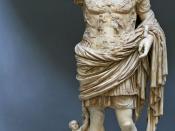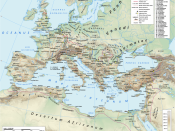The Roman Empire has had an overwhelming effect on most societies still today. From the fifteenth century, countries in Western Europe began basing certain aspects of their governance on the Roman Empire. Even the American constitution is based on the Roman political system. At its height the Roman Empire was a centralised government encompassing the majority of Europe, the Near East and much of Northern Africa. Although we have a great understanding of this period, new evidence is still coming to light today especially because of advancements in archaeological methods. Archaeology studies the material remains of previous human existence to ascertain information on their life and culture. There are many sources of information available for archaeologists on the Roman Empire, the main ones of which I will be discussing in this essay. These include: inscriptions, letters, Roman architecture and sculpture, and other archaeological information such as pottery and evidence from classical historians during the Roman period.
Letters are of great use to archaeologists for many reasons. They are quite rare for ancient periods and can therefore give invaluable information on how people communicated and the types of people that wrote letters. It also tells us the opinions and views of the author and documents events that went on that otherwise may not have been catalogued. An example of several Roman letters has been found at an excavation of a Roman fort in Vindolanda, Northumberland. They are written on wooden tablets and mainly give information on military affairs, such as the strength of the military units and supplies. There is also other information given on the diet of the soldiers: "The lists tell us much about the diet of the auxiliaries who appear to have done very well. There are frequent mentions (and sometimes price details) of grain, wine,


